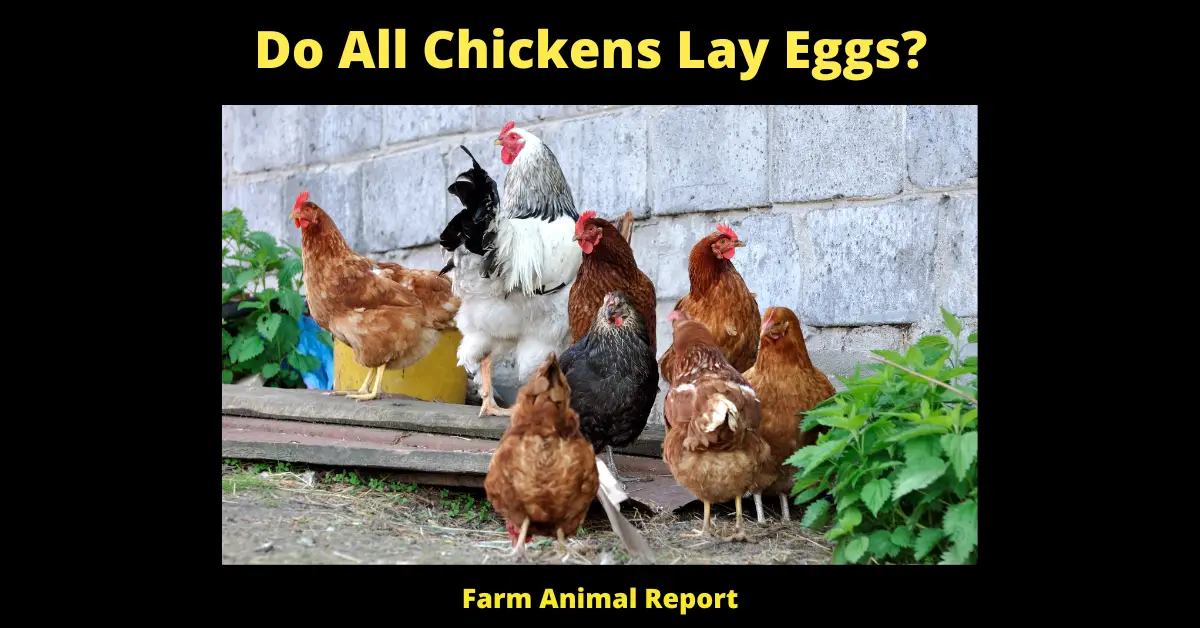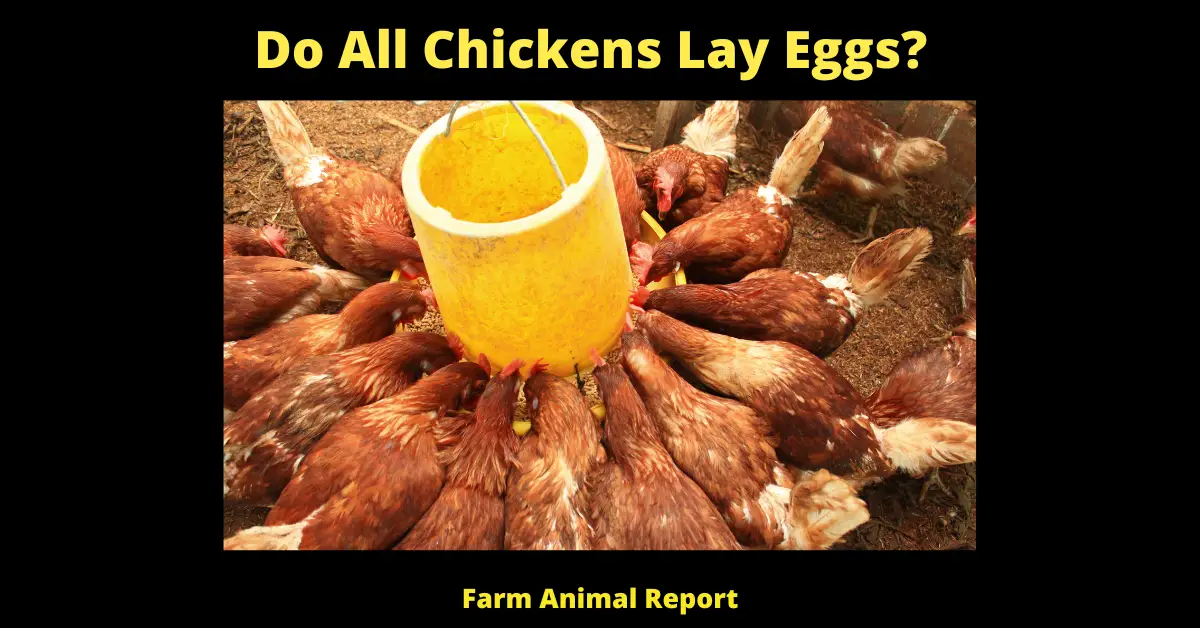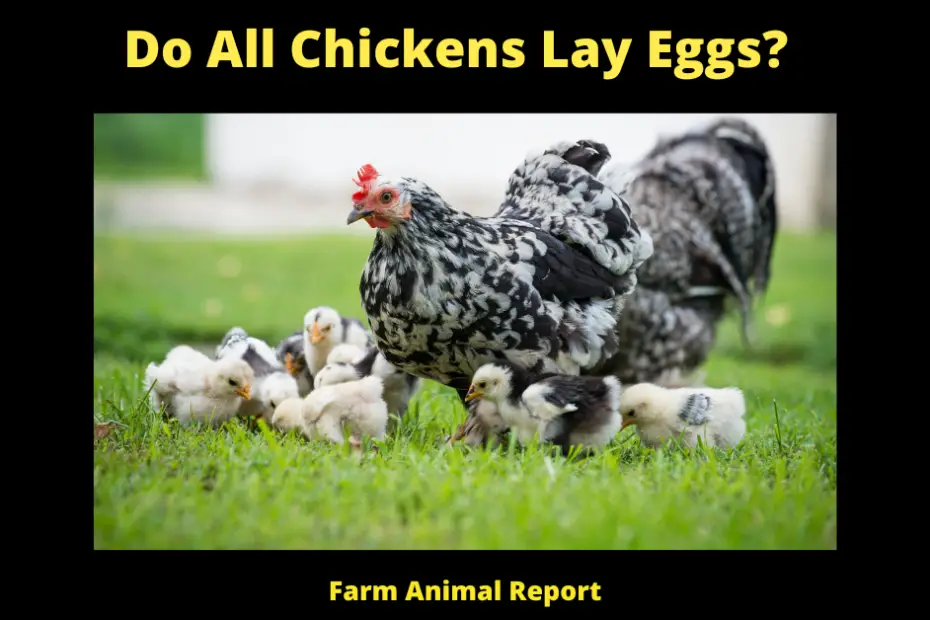Not all chickens lay eggs. In fact, most of the world’s chickens are male. Male chickens are usually raised for meat, while female chickens are kept for egg production. However, even among egg-laying chickens, there is a lot of variation.
Some chickens, from their first egg, lay large eggs, while others lay smaller ones. Some lay brown eggs, while others lay white ones. And some chickens lay eggs almost every day, while others may only lay a few per week.
So if you’re looking for a chicken that will provide you with a steady supply of eggs, it’s a good idea to do your research and choose a breed that is known for its high egg-laying ability.
Do All Chickens Lay Eggs?
There’s a common misconception that all chickens lay eggs. However, this isn’t actually the case – only female chickens lay eggs. Male chickens, or roosters, don’t lay eggs – they are used for their meat. So if you’re wondering whether or not your pet chicken will lay eggs, the answer is yes – as long as it’s a female!
All Female Chickens Can Lay Eggs
No, not all chickens lay eggs. Chickens (breeds of chickens) that are kept for egg production are called layer hens, while those that are raised for meat are called broilers. Layer hens typically begin laying eggs at around 18 weeks of age and will continue to lay eggs for about two years. Do All Chickens Lay Eggs?
After that point, their egg production declines, and they are typically culled from the flock. While some chickens may continue to lay a few eggs even after they reach this point, they will not lay enough to make them commercially viable.

In contrast, broilers are typically slaughtered before they reach 10 weeks old, (2 1/2 months of age). As a result, they never produce eggs and are not suitable for egg production. Consequently, not all chickens lay eggs; only those that are specifically bred for egg production will do so. Egg Production is also affected by Hours of Daylight.
What is an Egg?
A Chicken Egg is an Oval object laid by a female Hen (healthy hen).
The Egg contains all the nutrients for life except vitamin C.
An Egg is ;
- 31% yoke
- 58% white
- 11% shell
- it contains 75% water
- 12% protein
- 12 % fat
What is a Hen?
A hen is a female chicken that is at least one year of age. Before that, she is called a pullet. Hen comes from the German word Henne – meaning hen.
A hen is a female chicken. All chickens are descendants of the red junglefowl, the national bird of Sri Lanka. Hens are usually kept for their eggs, which are used for food. Chickens have domesticated about 8,000 years ago in Asia. Hens typically lay one egg per day(number of Eggs).
The color of a chicken’s egg is determined by the breed of the chicken. Brown eggs are laid by hens with red feathers, while white eggs are laid by hens with white feathers. The size of an egg is also determined by the breed of chicken.
Some hens, laying hens, young hens, and broody hens, can lay over 300 eggs per year, (a few less in cold weather, shorter daylight hours, cold winters, and egg production decreases)! Hens need to eat a balanced diet of grains, vegetables, oyster shells, layer feed, and insects in order to lay healthy eggs. Hens also need access to clean water. When hens stop laying eggs, they are typically slaughtered for their meat.

How does a Female Chicken Produce an Egg?
Every day, millions of chickens lay eggs. But how exactly do they do it? The process begins when the chicken eats food and passes it into her digestive system. The food then enters the gizzard, which is a muscular organ that grinds up the food.
From there, the food moves into the small intestine, where nutrients are absorbed. The small intestine also produces a yellowish substance called bile, which helps to break down fat. The bile enters the large intestine, where water is absorbed and feces are formed. Finally, the feces pass into the cloaca, which is a common chamber for the digestive, urinary, and reproductive tracts.
When a chicken lays an egg, her body first forms the eggshell around the egg yolk. The egg then travels down the oviduct, where it is coated with albumen (the egg white). Finally, it passes out of the chicken’s body through the vent. The whole process takes about 26 hours from start to finish. So next time you enjoy an omelet or scrambled eggs, take a moment to appreciate all that went into making them!
Types of Chicken Breeds
| Chicken Breeds | Origin | Meat/ Layers / Dual Purpose | Finished Weight | Eggs per Week | Weeks to Slaughter |
|---|---|---|---|---|---|
| Broilers | Canada/US/Europe | Meat | 3.3 lbs | 5 | 14 Weeks |
| Cornish crosses | England | Meat | 6.5 - 8.5 lbs | 3 | 8 - 9 Weeks |
| Jersey Giants | USA | Meat ( Intended to replace Turkeys) | 13 lbs | 4 | 8 - 9 Months |
| Hertigage Breeds | 6 - 9 months | ||||
| Delaware | USA Delaware | Duo | 6.5 lbs | 4 - large | 8 Months |
| Dorking | United Kingdom | Duo | 10 - 14 lbs | 5 - med | 5 Months |
| Buckeye | USA Ohio | Duo | 6 - 9 lbs | 4 - med | 5 Months |
| Rhode Island Red | USA Rhode Island | Duo | 6 b- 8 lbs | 5-6 | 5 Months |
| Leghorn | Italy | Eggs | 4 -5 lbs | 4 | 8 Months |
| Plymouth Rock | USA - Massachusetts | Duo | 7.5 lbs | 4 | 5 Months |
| Sussex | United Kingdom | Duo | 7 lbs | 4 - 5 - large | 5 Months |
| Wyandotte | Canada | Duo | 7 - 9 lbs | 5 Months | |
| Welsummer | Netherlands | Duo | 7 lbs | 4 / Week | 5 Months |
| Hamburg | United Kingdom | Eggs | 7 lb | 4 - med | 9 weeks |
| Black Australorp | Australia | Duo | \3 - 5 lb | 5 - med | 5 months |
| Buff Orpington | England | Duo | 7 - 8 Lbs | 4 - 5 | 8 months |
| Brahma | Meat | 11 lbs | 3 - med | 5 monthss |
Origin
Meat Breeds
Laying Breeds
Dual Purpose Breeds
Will A Female chicken will lay eggs without a Rooster?
Yes, it is possible for a female chicken to lay eggs without a rooster present. This is because the presence of a rooster is not necessary for the hen to produce an egg. Eggs are actually produced by the hen’s ovaries, and they are typically fertilized by a rooster’s sperm before they are laid.
In Your Free Range, Backyard Flock, However, if there is no rooster present, the eggs will not be fertilized and will not hatch. Nevertheless, many people still choose to keep roosters around for other purposes, such as protection from predators and encouraging hens to lay more eggs.

Why Only Fertilized Eggs are capable of Hatching?
In order for an egg to hatch, it must be fertilized. This means that it must come into contact with sperm from a male of the same species. The sperm penetrates the egg and combines with the egg’s cells to form a new cell. This new cell is known as a zygote.
The zygote begins to divide and grow, eventually developing into an embryo. Once the embryo is fully developed, it hatches from the egg and is ready to begin its life. Only fertilized eggs are capable of hatching because only they contain the necessary genetic material for development.
How are Fertile Chicken Eggs Hatched?
Fertile chicken eggs are typically hatched using one of two methods: natural incubation or artificial incubation. With natural incubation, the hen sits on the eggs to keep them warm until they hatch. This method is often used by small farmers or hobbyists who only have a few chickens.
Artificial incubation, on the other hand, is typically used by commercial hatcheries. In this process, the eggs are placed in an incubator where they are kept at a consistent temperature until they hatch. After about 21 days, the chicks will start to hatch and will be ready to be moved to a brooder where they will be raised until they are old enough to be released into the flock.
There are two methods of hatching chicken eggs: artificial incubation or natural incubation. Artificial incubation is when the eggs are placed in an incubator, which is temperature and humidity-controlled. The eggs must be turned a few times a day to stop the embryo from sticking to the shell. After 21 days, the chicks will start to hatch. Natural incubation is when the hen sits on the eggs to keep them warm. The hen will turn the eggs a few times a day.
After 21 days, the chicks will start to hatch. During the last few days before hatching, the chick will use its egg tooth, a sharp bump on its beak, to peck a hole in the shell. It will then take up to 12 hours to fully hatch out of the shell. Chicks need to be kept warm and dry after they hatch. They will also need access to fresh water and food. Chick crumbs or chicken pellets are good food for them. Once they are fully feathered, they can be moved outside into a coop or pen.
Do Male Chickens lay Eggs?

No, male chickens do not lay eggs. Only female chickens lay eggs. This is because only female chickens have the reproductive organs necessary for laying eggs. Male chickens do not have ovaries, and they do not produce the hormone estrogen, which is necessary for egg production
Male chickens, or roosters, are not capable of laying eggs. Only female chickens, or hens, have the reproductive organs necessary for laying eggs. The ovaries of a hen produce eggs which are then fertilized by the rooster’s sperm before being laid.
A rooster does not have ovaries and therefore cannot produce eggs. In some cases, a rooster may develop ovarian tissue and be able to lay eggs, but this is rare and typically only occurs in birds that have been treated with hormones. Male chickens can still be used for breeding purposes, as they will mate with hens and help to produce offspring. However, they cannot lay eggs themselves.
How do Chickens lay eggs without a Male?

Chickens are interesting creatures. Unlike many other animals, they can lay eggs without a male present. In fact, a chicken’s sex organs are so basic that they don’t even have the ability to produce sperm. So, how does this process work? Chickens have something called a cloaca, which is an opening that is used for both waste elimination and reproduction.
During egg-laying, the chicken’s ovary sends an egg down the oviduct, where it is fertilized by a special glandular secretion. The egg then passes through the cloaca and is laid outside of the chicken’s body.
While this process doesn’t require a male chicken, it should be noted that chickens will only lay fertilized eggs if there is a rooster present. Without a rooster, the eggs will not be fertilized and will not hatch.
Do Chickens lay eggs every Day?

Chickens lay eggs an average of once per day, though this can vary somewhat depending on the breed of chicken and other factors. For example, some chickens may lay more than one egg per day, while others may only lay eggs every few days. However, most chickens will fall somewhere in the middle, laying an egg once per day on average.
Chickens typically stop laying eggs when they reach a certain age, which also varies depending on the breed. So, while it is not guaranteed that chickens will lay eggs every day of their lives, it is certainly possible for them to do so.
How Long do Chickens lay Eggs?

Chickens typically lay eggs for three to five years but can lay eggs for up to 15 years. The average chicken lays about 250 eggs per year. However, this number can vary depending on the breed of chicken and the individual bird’s health and age.
Chickens will typically start laying eggs when they are around 18 weeks old. production usually decreases as the chicken gets older. Some factors that can impact a chicken’s egg-laying ability include nutrition, stress, and disease. For example, a chicken that is not getting enough calcium will produce fewer and smaller eggs.
By providing your chickens with a balanced diet and maintaining their health, you can help them lay eggs for many years to come.
How many Eggs do chickens lay Naturally?
Chickens naturally lay around four to five eggs per week. Although this can differ depending on the breed of chicken, most will lay between 250 and 300 eggs per year.
Chickens usually start laying eggs when they are between 18 and 24 weeks old, and will continue to lay eggs for approximately two years before their productivity begins to decline. While commercially raised chickens are often given hormone injections to increase their egg production, free-range chickens will lay fewer, but larger and healthier eggs.
As a result, it is important to consider the conditions in which the chicken was raised when purchasing eggs.
Do chickens lay eggs in the Winter ?

Chickens do lay eggs in the winter, though their laying may be reduced due to the shorter days and cooler temperatures. In order to encourage chickens to lay eggs during the winter, some chicken owners use artificial lighting to extend the amount of time the chickens are exposed to light each day.
Chickens need 14-16 hours of light each day in order to lay eggs, so providing them with additional lighting can help them to maintain their laying schedule even during the darkest months of the year.
How many Eggs does a Chicken Lay per Year?

On average, a chicken will lay about 260 eggs per year. However, this number can vary depending on the breed of chicken and the age of the bird. For example, older chickens typically lay fewer eggs than younger birds, and some breeds are known for being more prolific egg-layers than others.
Nevertheless, the average chicken will continue to lay a dozen or so eggs each month throughout its lifetime. So, if you’re thinking about starting a small farm, you can expect your flock of chickens to provide you with a steady supply of fresh eggs!
How many Eggs does a Chicken lay in a Week?
Normally 4-7 eggs per week.
On average, a chicken will lay one egg every day. However, there are a number of factors that can influence how many eggs a chicken lays in a week. For example, the age and breed of the chicken will play a role.
Younger chickens and heritage breeds tend to lay fewer eggs than older chickens and commercial breeds. Additionally, the time of year can also affect egg production. Chickens typically lay fewer eggs in the winter months than they do in the spring and summer. Finally, the amount of food and water available to the chicken can impact how many eggs it lays.
A chicken that is well-fed and has access to clean water is more likely to lay eggs on a regular basis than one that does not have these things. As a result, there is no definitive answer to how many eggs a chicken will lay in a week. It all depends on the individual chicken.
Final Thoughts – Do all Chickens Lay eggs
All-female chickens are capable of laying unfertilized eggs. For an Egg to hatch it needs to be fertilized by a male rooster.
Have Fun Greg





